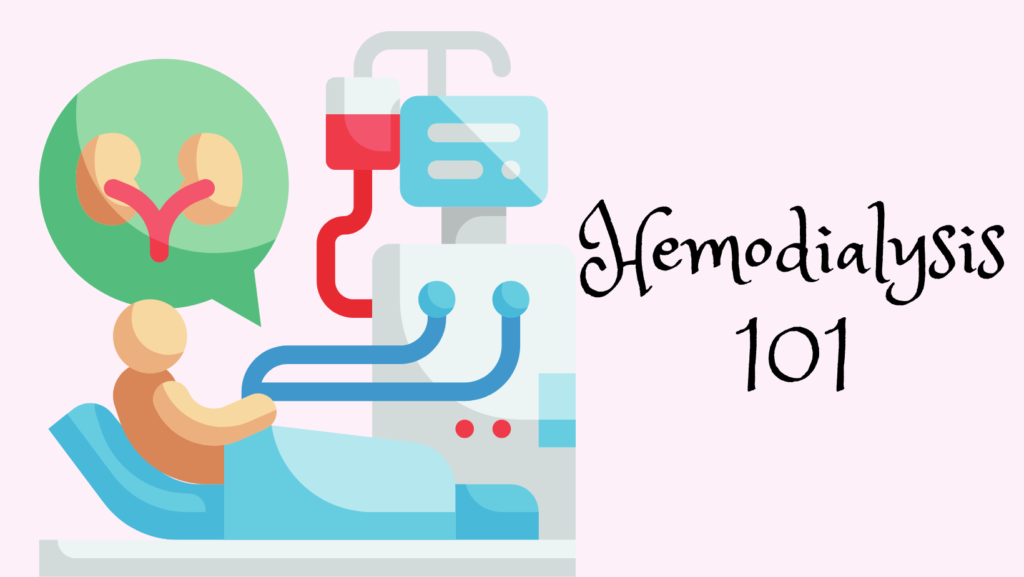If you’re scared because you’ve been told you are to start hemodialysis, know that you’re not alone. Many people feel that way when facing a change in their lives.
One of the most common questions that arise when beginning hemodialysis is whether the process is painful or not. Additional concerns are whether there are alternatives to dialysis or if they have to be on dialysis for life.
If you were diagnosed with chronic kidney disease (CKD) at an early stage, your healthcare team would likely have prepared you for the dialysis process. However, some others only discover their condition at a later stage, leaving them wholly unprepared for hemodialysis.
In this blog post, we will address some concerns and aim to provide you with a degree of preparation for the journey ahead.
Learn about the process
The first step to ease your worries is to learn about the dialysis process. Often, anxiety stems from not knowing enough about what to expect. So, to prepare you for hemodialysis, it is best you check out some informational posts and videos about hemodialysis so you can understand more about it.
In a nutshell, hemodialysis is a process of removing wastes from your body using a specialized machine. A tube is connected to your vein, and blood is drawn out of your body into the dialyzer, where it gets cleaned before being returned to your body. Some people say watching the blood leave their bodies felt scary. But over time, as you get accustomed to the process, you will realize it’s nothing to be scared of.
How painful is hemodialysis
The dialysis process is not painful. You may feel some discomfort as the blood leaves you. But for the most part, it is a comfortable process. One of the most uncomfortable aspects can be when healthcare professionals need to secure access to your bloodstream. They use needles to locate a vein and insert a catheter. However, for those using a catheter, anesthesia is administered to ensure your comfort during the process.
If you have a tunneled catheter, you can use it for several months before removal, meaning you’ll only experience the pain during the initial insertion period. Overall though, the dialysis process is generally comfortable.

Alternative to hemodialysis
If your kidneys have minimal residual function, they are no longer able to remove waste effectively, and dialysis becomes necessary. While some people may choose not to undergo dialysis for various reasons, it is crucial to recognize that without dialysis, the build-up of dangerous toxins could lead to multi-organ dysfunction and ultimately be fatal.
What will I need for hemodialysis?
As you prepare for hemodialysis, your healthcare team will guide you on what you’ll need for the process. If you’re having in-center dialysis, it’s a good idea to have someone accompany you for your first session, as some people may feel weak afterward and require assistance getting home. Others may feel fine and choose to come in for dialysis on their own.
To pass the time during the 2-5 hours of hemodialysis, you might want to bring a book or engage with your devices, such as playing video games or watching movies and skits. Alternatively, you can explore some educational content on our site.
How else can I prepare myself mentally?
Practicing mindfulness can be useful. Starting hemodialysis can trigger unwelcome emotions and questions. Some people feel angry and frustrated all over.
It’s natural to feel anger and frustration if you had tried various strategies to slow down the progression of the disease, only to find yourself at the end stage of kidney disease. But focusing on things you have no control over will do you no good. Remember that hemodialysis helps you stay alive and strong. It gives you an opportunity to enjoy life with your loved ones.
Focus instead on what you need to do to get the best in your care at this point in time. Embrace the changes you need to make in your lifestyle and discuss them with your healthcare team.
For example, if you are not producing enough urine, you will need to reduce the amount of fluid you take in. Your dietitian may also make some changes in your diet. If you’re having regular hemodialysis, your protein intake may be slightly increased by your dietitian to help prevent malnutrition.
Bottom line
Starting hemodialysis can be daunting. Learning more about hemodialysis can help you navigate the process better. It is generally a comfortable process, although you may experience some discomfort when your healthcare team tries to secure access to your blood.
Remember, you have the support of your healthcare team, loved ones, and valuable resources to help you through this phase. Stay strong and positive, and you’ll find the strength to cope with the challenges ahead.




